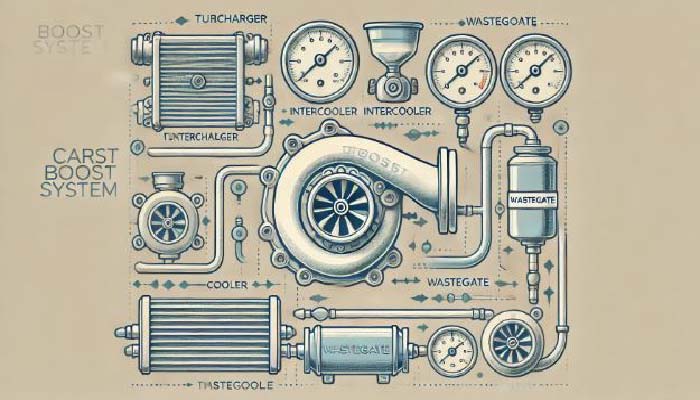Driving with confidence often means understanding the vital systems that keep your car running smoothly. One essential system in modern vehicles is the boost system, which helps improve your car’s performance. In this article, we will look at essential boost system checks that every driver should perform to ensure optimal vehicle function.
Introduction to the Boost System
The boost system is mainly responsible for increasing the power output of your car’s engine. In vehicles with turbochargers or superchargers, the boost system compresses air before it enters the engine, allowing for better fuel combustion. This process increases horsepower and overall engine efficiency. To avoid boost system failure and potential costly repairs, regular checks are essential.
Key Boost System Checks
- Check for Boost Leaks
- A boost leak can seriously affect your car’s performance. Leaks often occur in the intercooler, hoses, or intake manifold. When air escapes through leaks, the engine doesn’t receive enough compressed air, reducing its power output. Regularly inspecting hoses and clamps for wear and tear can help prevent leaks. Replacing any worn components is crucial to maintain boost system efficiency.
- Monitor Boost Levels
- Monitoring boost pressure with a gauge is essential. Boost pressure varies depending on the car’s model, but it should remain within a standard range. Too low or too high boost levels could indicate issues within the system, such as a faulty turbocharger or wastegate. Investing in a quality boost gauge can help detect issues early and prevent engine strain.
- Inspect the Turbocharger or Supercharger
- In vehicles with forced induction systems like turbochargers or superchargers, regular inspection is necessary. Turbochargers are especially vulnerable to wear due to high speeds and temperatures. Listening for unusual sounds, like whining or rattling, and checking for oil leaks around the turbo can reveal potential issues. Superchargers also require periodic maintenance to ensure they deliver consistent power.
- Examine the Wastegate and Bypass Valve
- The wastegate regulates boost pressure by diverting excess exhaust gases away from the turbocharger. A faulty wastegate can lead to over-boosting, causing severe engine damage. Similarly, the bypass valve, which releases pressure when the throttle is closed, needs to function correctly. If these components are not working properly, they can create performance issues and increase fuel consumption.
- Intercooler Maintenance
- The intercooler cools compressed air before it enters the engine. Clogged or dirty intercoolers reduce air intake efficiency, leading to poor engine performance. Checking the intercooler for any blockages, dirt, or leaks is crucial. Clean the intercooler periodically to maintain proper airflow and prevent overheating.
- Ensure Proper Oil Levels and Quality
- The turbocharger relies heavily on oil for cooling and lubrication. Low or poor-quality oil can cause turbo damage. Checking oil levels frequently and using high-quality oil recommended by the manufacturer will help keep your boost system healthy.
Why Regular Boost System Checks are Important
Ignoring boost system maintenance can lead to various performance issues and costly repairs. A healthy boost system ensures that the engine operates efficiently, providing a smoother, more powerful driving experience. By performing these checks regularly, drivers can prevent unexpected breakdowns and maximize their vehicle’s lifespan.
Common Symptoms of Boost System Problems
- Reduced Power: A common sign of a boost system issue is reduced power or acceleration.
- Unusual Noises: Whining, hissing, or rattling sounds can indicate problems with the turbocharger or leaks.
- Increased Fuel Consumption: Boost system issues often lead to inefficient fuel use.
- Smoke: Excess smoke from the exhaust may signal a turbocharger issue.
- Warning Lights: A “check engine” or similar warning light may indicate a boost system malfunction.
Final Thoughts
Being proactive with boost system checks can help prevent unexpected issues and ensure that your vehicle remains safe and efficient. By following these key checks, every driver can enjoy the benefits of a well-maintained boost system, including better fuel efficiency and engine performance.
FAQs
- What is the primary function of the boost system?
- The boost system increases the power output of a vehicle by compressing air entering the engine, enabling better combustion and efficiency.
- How often should I check my boost system?
- It’s advisable to perform a basic check every 5,000-10,000 miles, or as per the vehicle manufacturer’s recommendations.
- What are common signs of a boost leak?
- Common signs include reduced power, hissing sounds, and a decrease in boost pressure.
- Can I drive with a faulty boost system?
- Driving with a malfunctioning boost system is possible but not recommended, as it can lead to engine damage over time and increased fuel consumption.
- Why is intercooler maintenance important?
- A clean, well-functioning intercooler ensures that the compressed air entering the engine remains cool, which is essential for efficient combustion and overall performance.
If Like This Article Visit Our Website. Collect From Wekiapedia
